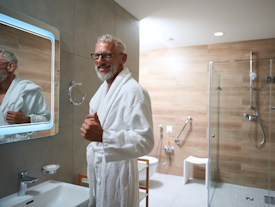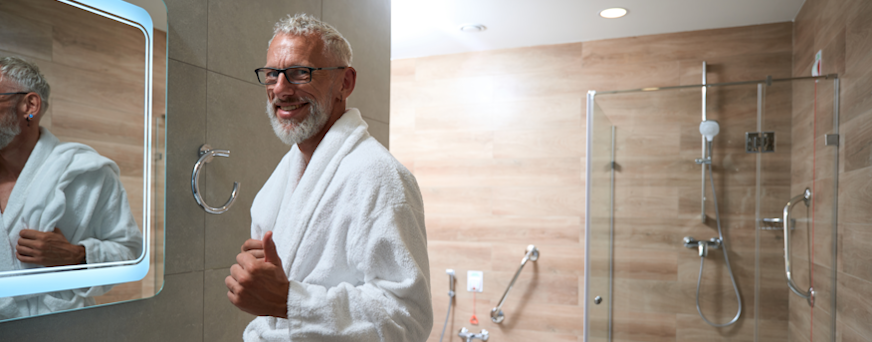How To Find The Best Wheelchair For Elderly
Mobility requirements may change as we age. Therefore, choosing the best wheelchair for elderly becomes an essential decision for promoting their independence and well-being.
This article gives information and recommendations on what factors are essential when selecting a wheelchair for an elderly person.
These aspects can be grasped and through the recommendations of doctors or other health care professionals, the right wheelchairs that will provide comfort and independence can be chosen.
If you are capable of walking but still concerned about your mobility, a medical alert system can be an added layer of safety to a wheelchair, especially when you have to navigate without it.
Life Assure Product Quiz
Take our 30 second quiz and discover which Life Assure medical alert device is the right fit for you or a loved ones.
Life Assure Product Quiz
Take our 30 second quiz and discover which Life Assure medical alert device is the right fit for you or a loved ones.
Things to Consider When Buying a Wheelchair for the Elderly

Here are certain factors that one needs to consider when buying the best wheelchair for elderly:
1. Understanding Needs
The first intervention is to be selective and assess the senior’s needs. The National Center for Mobility Management (NCMM) stresses assessing the user’s mobility, strength, and endurance capacity.
It means understanding whether the chair will frequently be used inside or outside or in both areas of use.
Is the user likely to need assistance with transfers or able to use their upper limbs to propel a wheelchair? They will help you narrow down to the kind of wheelchair that will suit the senior’s lifestyle and situation and will also make one understand their requirements.
2. Manual Vs. Power
Choosing between a manual and a power wheelchair depends on the user's physical capabilities. The Canadians Occupational Therapy Association (AOTA) recommends manual chairs for individuals with good upper body strength and endurance who can propel themselves.
Power wheelchairs offer greater independence for those with limited upper body strength or who require frequent travel over long distances. Consider factors like fatigue levels, desired level of control, and typical daily routines when making this crucial decision.
3. Comfort and Fit
One of the most essential aspects is to wear a comfortable and well-fitting wheelchair since this will help to avoid pressure ulcers and correct posture. According to NPIAP (1996), particular attention is paid to the size of the chair’s seat and support at the back.
Its width should be measured concerning the hips of the user, and additional features such as the depth of the seat, the angle of the backrest, and the armrests should be available.
A properly fitted chair should be comfortable to use regularly, provide correct body posture, and avoid specific sensitive areas of pressure after prolonged sitting. This will help them not to be tired the whole day.
4. Weight Capacity and Durability
Safety is paramount. According to the Medicare Rights Center (MRC), it is essential to consider weight capacity when selecting the best wheelchair for elderly. The chairs should support the intended usage and the weight of the user as mentioned above.
Also for durability, it is advisable to look for a chair with a strong framework and materials that is long lasting as it is frequently used. This makes sure the wheelchair is strong enough and enables safe mobility for future use.
5. Maneuverability and Portability
In the case of urban and rural places, the flexibility of mobility is vital in executing daily activities. These two are important factors when choosing the best wheelchair for elderly.
For interior use, ensure that the chairs have a small turning radius to enable them to turn in small circles so that it is easier to turn them in small places like homes.
6. Safety Features
Safety features are essential for preventing accidents and falls. It is recommended to prioritize features like brakes, wheel locks, and anti-tippers. Brakes should be easy to operate and strong enough to hold the chair securely on inclines.
Wheel locks prevent unwanted movement during transfers. Anti-tippers add stability and reduce the risk of tipping backward. Choosing a wheelchair with these safety features promotes a safe and secure mobility experience.
7. Additional Accessories
Additional accessories can enhance comfort and functionality. The Canadians Speech-Language-Hearing Association (ASHA) recommends exploring options like armrests for support during transfers, footrests for proper leg positioning, and headrests for added comfort during long journeys.
Consider storage options like backpacks or baskets to carry essential items. These accessories can personalize the wheelchair experience, improve user comfort, and promote greater independence in daily activities.
8. Budget and Insurance Coverage
Although cost is an important consideration, focus on getting a wheelchair that fits the user and is comfortable for them. Medicare.
Consider used wheelchairs bought or rented from reliable dealers who are selling high-quality used wheelchairs at a lower cost, rental programs that can be used while waiting for insurance approval, or applying for financial aid from various disability organizations like NOD.
These organizations offer resources and financial assistance programs to help acquire wheelchairs.
9. Trial and In-Person Evaluation
A healthcare professional should be involved in the selection process to ensure the best fit and safety of the patient. An individual is advised to seek therapy from a physical therapist or a doctor who knows disability mobility.
They can check the wheelchair of the user and properly fit it and suggest particular, models of wheelchairs or functions that suit the limitations and surroundings of a user. Also, a therapist helps a user handle a wheelchair correctly and how to transfer safely and securely. Their guidance can help out patient and family to buy what is best for them.
10. Long-Term Needs and Future Considerations
Since your mobility requirements may change in the future, it would be wise to choose a customizable wheelchair. According to the National Institute on Aging (NIA), the decision should be made to select a wheelchair that may include some modification as well in the future.
Check for capabilities such as movable seat parts, detachable and foldable armrests, and backs. These features enable the user to tilt them in a way that facilitates the good posture and comfort they require at any stage.
Thus, the choice of a multi-purpose wheelchair maintains the level of its usage improves the longevity, and quality of life, and helps ease out different tasks of the patient.
Conclusion
Selecting the best wheelchair for elderly is very vital especially when there is an alteration in mobility requirement.
They involve identifying some specific needs concerning support, seeking advice from healthcare professionals, and keeping in mind the aspect of comfort, safety as well as future adjustment to promote support with daily activities and general well-being.
If you are concerned about balance and mobility you can also consider a medical alert from Life Assure. If you’d like to learn more about medical alert systems, you can visit our How It Works page to see how this simple device can help keep you safe in case of falls and other emergencies.












 Get Help With The Push Of
A Button
Get Help With The Push Of
A Button















